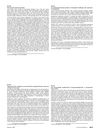Do Clinical Markers of Hyperandrogenism Relate to the Response of Acne to Conventional Therapy?
January 1990
in “
Journal of dermatological treatment
”
TLDR Clinical features of hyperandrogenism do not predict the success of conventional acne treatment in women.
In a study from 1990, 60 women with acne that was resistant to conventional antibiotic therapy were compared to 60 women whose acne had responded to such therapy to assess the relationship between clinical markers of hyperandrogenism and treatment response. The study found no significant difference between the two groups in terms of hirsutism scores, age at menarche, the incidence of various skin conditions, or menstrual irregularity. The results indicated that clinical features of hyperandrogenism are not associated with the effectiveness of conventional antibiotic therapy for acne, suggesting that these markers cannot be used to predict which female patients will benefit from this treatment approach.








